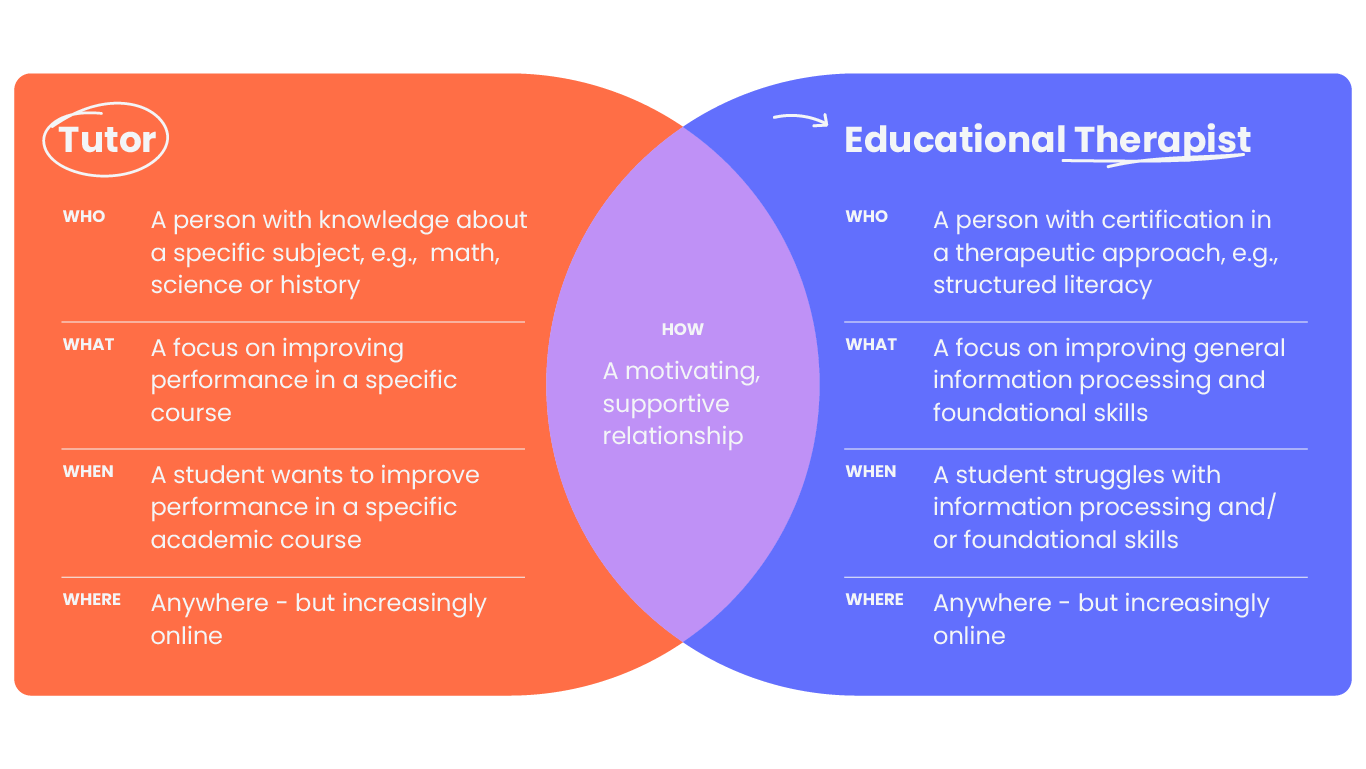Educational Therapy or Tutoring – Which Is Right For Your Child?
Written by Sandie Barrie Blackley, MA/CCC
Published on March 7, 2025
When a parent notices their child is struggling with reading, spelling, or writing a first impulse is often to seek help. In this article, we’ll discuss two types of help for struggling students: tutoring and educational therapy.
Tutors and therapists are similar in that they both work one-on-one with students, using a personal relationship to encourage motivation and accountability. But, that is where the similarity ends. The diagram below compares tutors and therapists.
While tutors use the course subject matter as the starting point, educational therapy typically begins with an assessment to pinpoint a student’s strengths and weaknesses as a basis for planning customized, targeted intervention.
Educational therapists are trained to work with issues like:
- dyslexia and other types of reading disorders
- dysgraphia and other types of writing disorders
- dyscalculia and other types of math disorders
- working memory issues
- performance-related stress and anxiety
- auditory and visual processing issues
- attention-deficit /hyperactivity disorder (ADHD)
- executive function difficulties (for example, organization and time management)
Do I Need a Tutor or an Educational Therapist?
A tutor may be the right choice if a student has gotten behind in a subject due to absence or schedule disruptions, or if the student has difficulty with a specific body of knowledge. However, an educational therapist is more likely the right choice to help a student overcome processing difficulties, learning challenges, or attention struggles.
5 Responses to Educational Therapy or Tutoring – Which Is Right For Your Child?
-
I am also a tutor training in the Orton Gillingham method of literacy instruction. I really like this article and do all of the things that are suggested here by Asha Jaleel. So I could call myself a therapist rather than a tutor as I have never been in the educational system but teacher trained at CQU for four years. I don’t follow the school curriculum but tailor the needs of the students to fit them and try to work out through observation what their needs would be.
-
This is a great article and something that needs more awareness. I am a parent who wasted years of time and money on educational/academic tutoring for my son who has dyslexia. We found Orton-Gillingham and he made up a 5 year reading gap in one year. To this day (he just graduated from college last May), he still remembers and speaks fondly of his Orton-Gilligham tutor, Alexandra. I’ve seen the power of certified Orton-Gillingham practitioners. Due to my experience as a parent, I have my advanced level Orton-Gillingham certification. My certification contains the words “education in therapy for dyslexia”.
-
I have an undergrad in SLD and a mastsr’s in socia workl. I have taught and tutored for over 20 years using OG programs. Could I call myself an educational therapist?
Leave a comment
Improve Your Child’s Reading
Learn more about Lexercise today.
Schedule a FREE
15-minute consultation




Thank you for this article. I am an educational therapist trained in the Orton-Gillingham multisensory approach, practicing in Sydney, Australia. Many parents tell me that they have seen tutors for years and that the tutors charge a lot less. The tutors, for the most part, are using the same methods that the children failed to grasp at school. An educational therapist builds rapport and shows students how they can learn effectively. As a wonderful lady told me when I was seeking help for my dyslexic son, ” More of the same isn’t going to work”.
I really love working as an independent therapist with my own practice as compared to my time working in special education in schools where teachers expected me to help children complete their schoolwork when they didn’t know their alphabet. I also get more of a chance to work with the parents who form an important part of learning support.